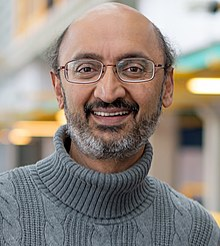Thanks for your participation in a vibrant workshop.
ACM EnergyDLT '22
ACM SIGEnergy Workshop on Energy, Blockchain & Distributed Ledger Technology
Thanks for your participation in a vibrant workshop.
ACM SIGEnergy Workshop on Energy, Blockchain & Distributed Ledger Technology
Blockchain and DLT are a disruptive paradigm to enable trustless decentralized verifiable applications. There are an increasing number of applications of blockchain technology to energy systems. For example, micro-payment for peer-to-peer EV charging, microgrid exchange and wholesale energy markets, renewable energy credits and emissions trading, and energy resource sharing and management. Besides their popularity, blockchain platforms (particularly, Bitcoin) suffer from significant energy consumption (overtaking all other areas in the IT sector).
In this workshop, we aim to explore the potential applications of blockchain and DLT to energy systems, as well as to address its energy efficiency issue. This workshop is organized through invited talks of well-known academics and practitioners. The second part of the workshop will be panel discussions of hot topics. It is held in conjunction with ACM e-Energy 2022 conference, and organized by ACM SIGEnergy (Special Interest Group on Energy Systems and Informatics).

Zhao Yang Dong (Fellow, IEEE) is currently with Nanyang Technological University, Singapore. His previous roles include a SHARP Professor and the Director of UNSW Digital Grid Futures Institute, The University of New South Wales, Australia; and the Ausgrid Chair and the Director of the Ausgrid Centre for Intelligent Electricity Networks providing support for the Smart Grid, Smart City National Demonstration Project. His research interests include smart grid, smart cities, power system planning and stability, renewable energy systems, electricity market, and computational methods for power engineering applications. He has served/is serving as an Editor for a number of IEEE Transactions and IET journals

Ümit Cali has more than 20 years international experience in the fields of energy systems, data science, blockchain technologies, ICT, energy markets and economics as professor, entrepreneur, researcher and CTO. Dr. Cali is also co-founder of US (NSF SBIR funded) and Europe based technology startup companies which are active in advanced energy informatics and blockchain. He is working as associate professor of Energy Informatics (AI & Blockchain) in the Norwegian University of Science and Technology. He is serving as Vice Chair of IEEE Blockchain in Energy Standards WG (P2418.5) and Chair of IEEE TEMS Special Interest Group on Energy DLT. Ümit is the leading author of “Digitalization of Power Markets and Systems using Energy Informatics” book.

Srinivasan Keshav is the Robert Sansom Professor of Computer Science in the Department of Computer Science and Technology at the University of Cambridge. His interests lie broadly at the intersection of computer science and sustainability. He received a B.Tech in Computer Science and Engineering from IIT Delhi in 1986 and a Ph.D. in Computer Science from the University of California, Berkeley in 1991. He was subsequently a Member of Technical Staff at AT&T Bell Labs and an Associate Professor at Cornell. In 1999 he left academia to co-found Ensim Corporation and GreenBorder Technologies Inc. Returning to academia, he was at the University of Waterloo in Canada from 2003 to 2019, holding a Canada Research Chair and later the Cisco Chair in Smart Grid. He is a Fellow of the Royal Society of Canada, ACM, and IEEE, and a Distinguished Alumnus of IIT Delhi. He served as Chair of ACM SIGComm, is the Vice-Chair of ACM SIGEnergy, and the founding Editor-in-Chief of Energy Informatics Review.

Jos Röling is an Open Group Distinguished Certified IT Architect and blockchain CTO in IBMs global center of excellence for Environment, Energy & Utilities, focusing on business transformation, business platforms and IT/OT convergence. As an energy transition thought leader, he has provided extensive support to utilities in many areas including transformational change, asset management, analytics, strategy development, and innovation in the provision of business platforms, increasingly around the seismic shifts currently taking place in the industry around distributed energy resources, renewable energy, storage, blockchain, viewing data as an asset, and the transition to a digital utility. He is working with energy and industrial customers globally to design, test, and operationalize value-based solutions for renewable generation, low carbon technologies, green energy certificates, energy trading, and electric vehicle solutions across new energy ecosystems.
As cyber-attacks such as supply chain and false data injection attacks on smart grids remain a major challenge, blockchain technology has emerged as an attractive solution for enabling smart grid security due to its transparency, immutability, and decentralisation characteristics. These attacks focus on compromising smart grid components, services, and operations. In this project, we propose blockchain-enabled security systems to mitigate smart grid cyber-attacks and further facilitate automated security agreements across the value chain of the smart grids. We analyse the security of our systems, and the results show that security resilience is achieved. Furthermore, we implemented a prototype of our supply chain system on the Ethereum blockchain and evaluated it for real-world smart grid supply chain attacks.
Modern power systems are evolving towards decarbonization and digitalization phases leading to Transactive Energy Systems (TES). Application of emerging technologies like Artificial Intelligence (AI) and Distributed Ledger Technology (DLT) to develop a TES is not an unheard topic of research. The joint operation of AI and DLT is providing various new opportunities and business models where smart contracts can play an enabler role to amalgamate interconnected systems like power systems and digital infrastructure and services. Furthermore, the current global environmental and political climate accentuates the need for clean energy sources combined with the need for deregulation, decentralization, decarbonization, digitalization, and democratization in the energy ecosystem. This workshop aims to demystify the potential of AI and DLT as enabler technologies for the Digital Green Transition of the energy industry from a TES perspective.
Carbon credits--especially those derived from nature-based solutions such as reforestation or averted deforestation--are deservedly viewed as being untrustworthy and their use by airlines and oil companies a barely-concealed form of greenwashing. In this talk, I will present a solution to these issues that leverages advances in earth observation, AI, cloud storage, and blockchain. This solution is being prototyped by the Cambridge Center for Carbon Credits (https://4c.cst.cam.ac.uk ) and I will discuss the current status and our vision for the future. [Slides]
In this talk I will share how the blockchain projects over the last 6 years in Energy have transformed into energy tokenization projects that I have done at IBM and at the not-for-profit 2tokens.org energy track. This collection of expertise has led to the “Programmable Energy” concept that brings together all lessons learned, to support the Energy Transition globally and the required acceleration in Europe by the REPowerEU program. [Slides]